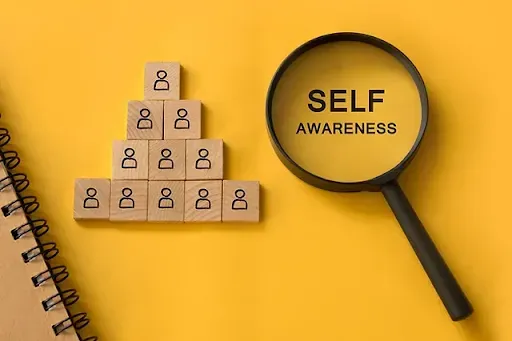Featured
- Get link
- X
- Other Apps
The neuroscience of consciousness and self-awareness
The neuroscience of consciousness and self-awareness
The neuroscience of consciousness and self-awareness is a fascinating and complex topic that has been studied by scientists and philosophers for centuries. In recent years, advances in neuroscience have allowed us to gain a better understanding of how the brain gives rise to our sense of self and consciousness.
What is self-awareness?
Self-awareness is the ability to recognize oneself as an individual separate from the environment and other individuals. It is the ability to introspect, or reflect on one's own thoughts, feelings, and behaviors. Self-awareness is a crucial aspect of consciousness, as it allows us to have a sense of self and to understand our place in the world.
The role of the brain in self-awareness
Research has shown that self-awareness is closely linked to activity in specific areas of the brain. One such area is the anterior precuneus (aPCu), which plays a critical role in forming our physical sense of self or "I"
. When activity in the aPCu is disrupted, people's perceptions of their place in the world dramatically change, invoking feelings of depersonalization.
Another area of the brain that is involved in self-awareness is the default mode network (DMN). The DMN is a network of brain regions that are active when the brain is at rest and not focused on the outside world. It is thought to play a role in self-referential thinking, or thinking about oneself and one's experiences.
The neuroscience of consciousness
Consciousness is a complex and multifaceted phenomenon that has been studied from many different angles. One approach is to study the neural correlates of consciousness, or the brain regions and activity patterns that are associated with conscious experience.Research has shown that consciousness is closely linked to activity in the prefrontal cortex (PFC), a region of the brain that is involved in decision-making, planning, and working memory.
The PFC is thought to play a crucial role in integrating information from different sensory modalities and generating a coherent sense of self and world.
Another approach to studying consciousness is to look at the different levels of consciousness that exist. For example, some researchers distinguish between stimulus-related awareness, which is the ability to detect and respond to stimuli in the environment, and cognitive action-related consciousness, which is the ability to plan and execute complex actions based on internal goals and intentions.
The evolution of self-awareness and consciousness
Self-awareness and consciousness are not unique to humans; many other animals also exhibit these abilities to varying degrees. For example, chimpanzees have been shown to recognize themselves in mirrors, indicating a level of self-awareness.
The evolution of self-awareness and consciousness is a topic of ongoing research and debate. Some researchers argue that these abilities are unique to humans and are the result of our highly developed prefrontal cortex.
Others argue that self-awareness and consciousness are more widespread in the animal kingdom and have evolved independently in different species.
Conclusion
The neuroscience of consciousness and self-awareness is a complex and multifaceted topic that has been studied from many different angles. Advances in neuroscience have allowed us to gain a better understanding of how the brain gives rise to our sense of self and consciousness. However, many questions remain unanswered, and the study of consciousness and self-awareness is likely to remain a topic of ongoing research and debate for years to come.
Citations:
[1] https://www.edge.org/conversation/vilayanur_ramachandran-the-neurology-of-self-awareness
[2] https://neurosciencenews.com/self-awareness-brain-23515/
[3] https://www.ncbi.nlm.nih.gov/pmc/articles/PMC4374625/
[4] https://www.ncbi.nlm.nih.gov/pmc/articles/PMC9623886/
[5] https://www.frontiersin.org/articles/10.3389/fnsys.2022.941534
[6] https://link.springer.com/article/10.1007/s10339-018-0855-8
Popular Posts

Why are Memories Forgotten?
- Get link
- X
- Other Apps

How is the Colour of a Lobster Determined?
- Get link
- X
- Other Apps

Can Sound Waves Solve Plastic Pollution?
- Get link
- X
- Other Apps

Can Animals Recognise Human Faces?
- Get link
- X
- Other Apps

Is the Earth Spinning Faster?
- Get link
- X
- Other Apps

Do plants sleep? The surprising science of sleep in the plant kingdom
- Get link
- X
- Other Apps

Can Bad Times Actually Improve Your Life? Surprising Benefits of Adversity
- Get link
- X
- Other Apps

Can Brain Implants Make You More Powerful?
- Get link
- X
- Other Apps

What factors affect lung capacity?
- Get link
- X
- Other Apps

The Future of Space Tourism and Its Impact
- Get link
- X
- Other Apps
Popular Posts

Why are Memories Forgotten?
- Get link
- X
- Other Apps

How is the Colour of a Lobster Determined?
- Get link
- X
- Other Apps

Can Sound Waves Solve Plastic Pollution?
- Get link
- X
- Other Apps

Can Animals Recognise Human Faces?
- Get link
- X
- Other Apps

Comments
Post a Comment